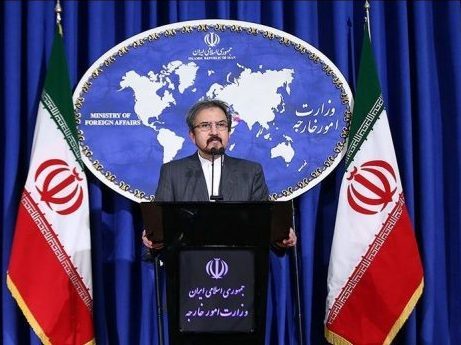“The issue of the Iranian missile [program] is an entirely defensive and deterrent matter and in no way contravenes Resolution 2231,” said Foreign Ministry Spokesman Bahram Qassemi in his weekly press briefing on Monday.
Resolution 2231 was adopted by the UNSC in July 2015 to endorse a nuclear agreement between Iran and six other countries, the so-called P5+1.
The UNSC document terminated the provisions of seven previous UNSC resolutions against Iran, some of which had imposed restrictions on Iranian missile activities. Such activities are not prohibited under the newer document, which merely calls on Iran “to refrain from any activity related to ballistic missiles designed to be capable of delivering nuclear weapons.”
Iran says it has no such warheads and no such missiles. It has put its nuclear program under enhanced international monitoring as part of the nuclear deal. And Iranian compliance with the deal has been consistently verified by the International Atomic Energy Agency (IAEA). Yet, the United States, a party to the agreement, has attempted to portray Iranian missile tests as a violation of the resolution.
While it has failed to get other countries on board, in main part because the text of the resolution is unambiguous, Washington has not stoppedclaiming that the Iranian missile program breaches Resolution 2231.
Such claims, Qassemi said in his Monday presser, were “unwarranted” and were “often made because of… [the accusers’] ill will toward Iran’s might, particularly its defensive power.”
Responding to a question about the potential violations of the nuclear deal by the US, Qassemi said Iranian decisions on whether violations had occurred rested with the high-level Supervisory Board that has been formed to monitor the implementation of the deal, officially known as the Joint Comprehensive Plan of Action (JCPOA).
He said decisions in that regard were technical and the Supervisory Board would be making relevant comments in the due time.
Iran and the P5+1 countries (Russia, the US, the UK, China, Britain, and France) reached the JCPOA on July 14, 2015 and began implementing it in January 2016.
Iran has been complaining that the US, under the administration of its new president, has been seeking to sabotage international trade with Iran. This is while according to the deal, the US must “refrain from any policy specifically intended to directly and adversely affect the normalisation of trade and economic relations with Iran.”
The US has also imposed sanctions on Iran over the country’s missile activities, including most recently on July 28.
Qassemi said that Iran and the US harbored mistrust of one another and that the recent measures adopted by Washington further deepened Tehran’s mistrust.
‘Banking difficulties persist’
A reporter asked Qassemi what measures had been taken to end banking restrictions on Iran.
He explained that certain difficulties still existed because of various technical and political reasons.
“Problems with big banks are still there,” he acknowledged, adding that “active economic diplomacy” was needed to facilitate banking transactions involving major banks.
‘Iran not delaying Saudi delegation’s visit’
The Iranian Foreign Ministry spokesman also rejected media reports that Iran has been behind a delay in the planned trip by a Saudi Arabian delegation to the country to visit the sites of Saudi Arabia’s former diplomatic perimeters.
He said visas had been issued for the Saudi delegates long before, and they were scheduled to arrive on a private jet. A permit had been issued for the flight at short notice but the Saudis could not be immediately notified because there were no direct communication channels, hence the delay, Qassemi said.
“They can travel to Tehran whenever they decide to,” he said of the Saudi delegates. “There is no prohibition on their visit.”
Iran, in the meanwhile, was awaiting the issuance of visas for its own delegation, which he said was due shortly.
Saudi Arabia severed its diplomatic relations with Iran in January 2016. Saudi Arabia had just executed a prominent Shia cleric back then, and protests were staged in front of the Saudi diplomatic premises in the cities of Tehran and Mashhad over the killing. A number of individuals attacked the two perimeters while they were vacant and caused some damage.
The attackers were arrested by Iran and received prison terms. But relations have remained tense.
‘Iran holds superior status in region’
Qassemi said the huge turnout by foreign officials in the recent inauguration ceremony of President Hassan Rouhani signified “the world’s new approach toward Iran.”
Senior representatives, including presidents and prime ministers, from 105 countries and nine international organizations took part in the inauguration ceremony on Saturday.
Qassemi said the participation of that many officials was “a clear signal of the defeat of the policy of Iranophobia. And one could say we hold a superior position in the region.”
‘Sadr entitled to his opinion’
Qassemi was asked about a recent visit by Iraqi cleric Mudtada Sadr to Saudi Arabia and anti-Iran remarks he reportedly made after the trip.
The Iranian spokesman said trips by Iraqi figures were an internal Iraqi matter.
He added that Sadr could express his opinions, but, “one should not take seriously the comments he has made about Iran.”
He said mistakes might have been made in reporting or translating Sadr’s remarks and said he hoped no such things had actually been said.
